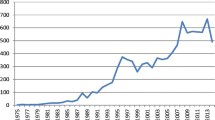Abstract
Experiences of teachers give evidence that the usal distinction between instrumental and relational understanding, as defined by the psychologist, is insufficient to interpret learning in an educational context. The learner often possesses relational understanding of some knowledge, for which he sees no use, outside its importance as “schoolknowledge”. The author analyzes a more general concept of instrumentalism. He defines it as a rationale for learning, connected to the role school has as an instrument for future schooling and employment. Examples of use of the project method are given, which can help to establish another rationale for learning.
Similar content being viewed by others
References
Altvater, E.: 1974. ‘Kvalifikation og erhvervsuddannelse’. Nordiska Sommeruniversitetet. Stencilserie, Nr. 2.
Bateson, G.: 1973, Steps to an Ecology of Mind, Paladin Books, Herts.
BloomB. S., HastingsT. and MadausG.: 1971. ‘Evaluation of learning in secondary school mathematics,’ In Handbook of Formative and Summative Evaluation of Student Learning, McGraw-Hill, New York.
BrunerJ.: 1960, The Process of Education, Vintage Books, N.Y.
DouglasP.: 1973, Understanding Everyday Life, Routledge and Kegan Paul, London.
FreudenthalH.: 1974, Mathematics as an Educational Task, D. Reidel, Dordrecht.
Hoyles, C.: 1979, Factors in School Learning From the Pupil's View, Chelsea College, Univ. of London.
HuiskenF.: 1972, Zur Kritik Bürgerlicher Didaktik und Bildungsökonomie, List, München.
Jahnke, N.: 1978, ‘Zum Verhältnis von Wissenentwicklung und Begründung in der Mathematik-Beweisen als Didaktisches Problem’, Materialen und Studien Band 10, IDM, Universität Bielefeld.
LabovW.: 1972, ‘The logic of non-standard English,’ in Language and Social Context, ed. by P.Giglioli, Penguin, London.
Masuch, M.: 1974, Udannelsens politiske økonomi Rhodos. Kb.h.
Mead, G. H.: 1934, Mind, Self and Society, University of Chicago Press.
Mead, G. H.: 1965, On Social Psychology, University of Chicago Press.
Mellin-OlsenS.: 1977, Læring som sosial prosess, Gyldendal, Oslo.
Nuffield-Project: 1967, Pictorial Representation, Newgate Press Ltd., London.
SchutzA.: 1967, Collected Papers I-III, M. Nijhoff, The Hague.
SkempR. R.: 1979, Intelligence, Learning and Action, Wiley, London.
Skemp, R. R. and Mellin-Olsen, S.: 1973, Qualitative Differences in Mathematical Thinking, Report to the Nuffield Foundation and the NAVF, Norway.
Tyler, R.: 1950, Principles of Curriculum and Instruction, University of Chicago Press.
WillisP.: 1977, Learning to Labour, Saxon House, Farnborough, U.K.
Additional information
Bergen State College of Education
The author of this article is a senior lecturer at the Bergen State College of Education. He has practised for several years as a teacher in the comprehensive school, where he has worked especially among the slow learners. In his native language he has written several books on mathematics education.
Rights and permissions
About this article
Cite this article
Mellin-Olsen, S. Instrumentalism as an educational concept. Educ Stud Math 12, 351–367 (1981). https://doi.org/10.1007/BF00311065
Issue Date:
DOI: https://doi.org/10.1007/BF00311065




